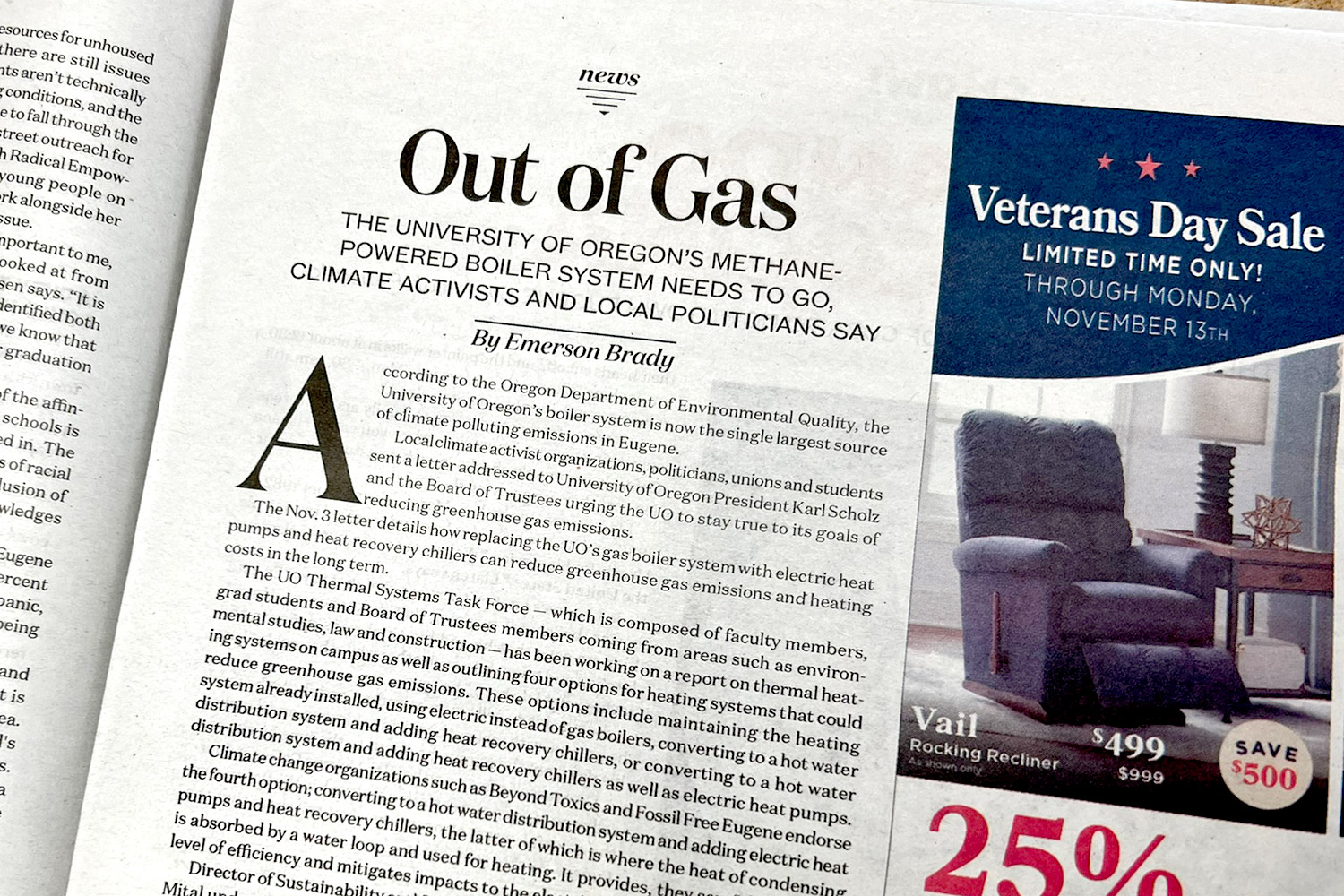According to the Oregon Department of Environmental Quality, the University of Oregon’s boiler system is now the single largest source of climate polluting emissions in Eugene.
Local climate activist organizations, politicians, unions and students sent a letter addressed to University of Oregon President Karl Scholz and the Board of Trustees urging the UO to stay true to its goals of reducing greenhouse gas emissions.
The Nov. 3 letter details how replacing the UO’s gas boiler system with electric heat pumps and heat recovery chillers can reduce greenhouse gas emissions and heating costs in the long term.
The UO Thermal Systems Task Force — which is composed of faculty members, grad students and Board of Trustees members coming from areas such as environmental studies, law and construction — has been working on a report on thermal heating systems on campus as well as outlining four options for heating systems that could reduce greenhouse gas emissions. These options include maintaining the heating system already installed, using electric instead of gas boilers, converting to a hot water distribution system and adding heat recovery chillers, or converting to a hot water distribution system and adding heat recovery chillers as well as electric heat pumps.
Climate change organizations such as Beyond Toxics and Fossil Free Eugene endorse the fourth option; converting to a hot water distribution system and adding electric heat pumps and heat recovery chillers, the latter of which is where the heat of condensing is absorbed by a water loop and used for heating. It provides, they say, “the greatest level of efficiency and mitigates impacts to the electric grid.”
Director of Sustainability and facilitator of the Thermal Systems Task Force Steve Mital understands the appeal of option four for its dramatic decrease in emissions, but also notes in an email that it would cost several hundred million dollars and take 12 years to implement. Mital writes, “Option four would be the most complicated and expensive construction project in the University of Oregon’s nearly 150-year history.”
Fossil Free coalition coordinator Aya Cockram says, “This is an issue that matters to the community because we have climate goals that we’re trying to meet and we can’t do that without the university.”
The letter, signed by such local politicians as Mayor Lucy Vinis and Oregon state Sen. James Manning, notes that Eugene’s Climate Recovery Ordinance calls for fossil fuel use to go down by 50 percent from what it was in 2010 by 2030.
“The UO has a once-in-a-generation chance to lead our state in the transition off polluting fossil fuels — and in doing so, creating good, living-wage, union jobs,” Manning says in an email.
Cockram points out that using the boiler system to heat the university not only increases greenhouse gas emissions but also imposes health risks to students, faculty and those who live near campus. A study done by the Harvard T.H. Chan School of Public Health in 2021 concludes that burning fossil fuels in buildings was responsible for 20 premature deaths in Oregon in 2017. “Gas harms communities and disproportionately harms communities of color,” Cockram says. “Gas harms the lungs of young people.”
The letter says the university’s 2021 GHG (greenhouse gas) Inventory shows that most of the institution’s greenhouse emissions come from using methane in buildings, amounting to more than 22,000 metric tons annually.
Cockram and Alyssa Rueda, a recent UO graduate and climate justice organizer for Beyond Toxics, both say the UO has promised to be more sustainable, but that communication with the wider public about what that looks like has been lacking. “When I first started at the UO there was a big highlight on the things that the UO does right like reusable plates, the plants around the buildings and how that’s a way to filter waste water, but I feel like I didn’t hear about what could be done better,” Rueda says.
The UO Thermal Systems Task Force has until March 2024 to decide which heating system option it will recommend to the university.
To learn more about the UO Thermal System Task Force and its proposals for a new heating system go to cpfm.uoregon.edu/thermal-systems-transition-study-task-force. The task force is planning to share information with students and faculty at public forums from 6 pm to 7:30 pm Jan. 16 and from 12:30 to 2 pm Jan. 17. Both events will be held in the EMU Ballroom.
